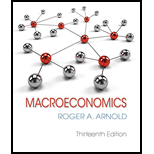
Macroeconomics
13th Edition
ISBN: 9781337617390
Author: Roger A. Arnold
Publisher: Cengage Learning
expand_more
expand_more
format_list_bulleted
Question
Chapter 15, Problem 16QP
To determine
The problems arising from decline in nominal
Expert Solution & Answer
Want to see the full answer?
Check out a sample textbook solution
Students have asked these similar questions
profit maximizing and loss minamization fire dragon co mindtap
Problem 3
You are given the following demand for European luxury automobiles:
Q=1,000 P-0.5.2/1.6
where P-Price of European luxury cars
PA = Price of American luxury cars
P, Price of Japanese luxury cars
I= Annual income of car buyers
Assume that each of the coefficients is statistically significant (i.e., that they passed the t-test).
On the basis of the information given, answer the following questions
1. Comment on the degree of substitutability between European and American luxury cars and
between European and Japanese luxury cars. Explain some possible reasons for the results in
the equation.
2. Comment on the coefficient for the income variable. Is this result what you would expect?
Explain.
3. Comment on the coefficient of the European car price variable. Is that what you would expect?
Explain.
Problem 2:
A manufacturer of computer workstations gathered average monthly sales figures from its 56 branch
offices and dealerships across the country and estimated the following demand for its product:
Q=+15,000-2.80P+150A+0.3P+0.35Pm+0.2Pc
(5,234) (1.29) (175) (0.12) (0.17) (0.13)
R²=0.68 SER 786 F=21.25
The variables and their assumed values are
P = Price of basic model = 7,000
Q==Quantity
A = Advertising expenditures (in thousands) = 52
P = Average price of a personal computer = 4,000
P.
Average price of a minicomputer = 15,000
Pe Average price of a leading competitor's workstation = 8,000
1. Compute the elasticities for each variable. On this basis, discuss the relative impact that each
variable has on the demand. What implications do these results have for the firm's marketing
and pricing policies?
2. Conduct a t-test for the statistical significance of each variable. In each case, state whether
a one-tail or two-tail test is required. What difference, if any, does it make to…
Chapter 15 Solutions
Macroeconomics
Ch. 15.1 - Prob. 1STCh. 15.1 - Prob. 2STCh. 15.1 - Prob. 3STCh. 15.4 - Prob. 1STCh. 15.4 - Prob. 2STCh. 15.4 - Prob. 3STCh. 15 - Prob. 1QPCh. 15 - Prob. 2QPCh. 15 - Prob. 3QPCh. 15 - Prob. 4QP
Ch. 15 - Prob. 5QPCh. 15 - Prob. 6QPCh. 15 - Prob. 7QPCh. 15 - Prob. 8QPCh. 15 - Prob. 9QPCh. 15 - Prob. 10QPCh. 15 - Prob. 11QPCh. 15 - Prob. 12QPCh. 15 - Prob. 13QPCh. 15 - Prob. 14QPCh. 15 - Prob. 15QPCh. 15 - Prob. 16QPCh. 15 - Prob. 17QPCh. 15 - Prob. 18QPCh. 15 - Prob. 1WNGCh. 15 - Prob. 2WNGCh. 15 - Prob. 3WNGCh. 15 - Prob. 4WNGCh. 15 - Prob. 5WNGCh. 15 - Graphically portray the Keynesian transmission...Ch. 15 - Prob. 7WNGCh. 15 - Prob. 8WNG
Knowledge Booster
Similar questions
- You are the manager of a large automobile dealership who wants to learn more about the effective- ness of various discounts offered to customers over the past 14 months. Following are the average negotiated prices for each month and the quantities sold of a basic model (adjusted for various options) over this period of time. 1. Graph this information on a scatter plot. Estimate the demand equation. What do the regression results indicate about the desirability of discounting the price? Explain. Month Price Quantity Jan. 12,500 15 Feb. 12,200 17 Mar. 11,900 16 Apr. 12,000 18 May 11,800 20 June 12,500 18 July 11,700 22 Aug. 12,100 15 Sept. 11,400 22 Oct. 11,400 25 Nov. 11,200 24 Dec. 11,000 30 Jan. 10,800 25 Feb. 10,000 28 2. What other factors besides price might be included in this equation? Do you foresee any difficulty in obtaining these additional data or incorporating them in the regression analysis?arrow_forwardsimple steps on how it should look like on excelarrow_forwardConsider options on a stock that does not pay dividends.The stock price is $100 per share, and the risk-free interest rate is 10%.Thestock moves randomly with u=1.25and d=1/u Use Excel to calculate the premium of a10-year call with a strike of $100.arrow_forward
- Please solve this, no words or explanations.arrow_forward17. Given that C=$700+0.8Y, I=$300, G=$600, what is Y if Y=C+I+G?arrow_forwardUse the Feynman technique throughout. Assume that you’re explaining the answer to someone who doesn’t know the topic at all. Write explanation in paragraphs and if you use currency use USD currency: 10. What is the mechanism or process that allows the expenditure multiplier to “work” in theKeynesian Cross Model? Explain and show both mathematically and graphically. What isthe underpinning assumption for the process to transpire?arrow_forward
- Use the Feynman technique throughout. Assume that you’reexplaining the answer to someone who doesn’t know the topic at all. Write it all in paragraphs: 2. Give an overview of the equation of exchange (EoE) as used by Classical Theory. Now,carefully explain each variable in the EoE. What is meant by the “quantity theory of money”and how is it different from or the same as the equation of exchange?arrow_forwardZbsbwhjw8272:shbwhahwh Zbsbwhjw8272:shbwhahwh Zbsbwhjw8272:shbwhahwhZbsbwhjw8272:shbwhahwhZbsbwhjw8272:shbwhahwharrow_forwardUse the Feynman technique throughout. Assume that you’re explaining the answer to someone who doesn’t know the topic at all:arrow_forward
arrow_back_ios
SEE MORE QUESTIONS
arrow_forward_ios
Recommended textbooks for you
 Economics (MindTap Course List)EconomicsISBN:9781337617383Author:Roger A. ArnoldPublisher:Cengage Learning
Economics (MindTap Course List)EconomicsISBN:9781337617383Author:Roger A. ArnoldPublisher:Cengage Learning
 Economics Today and Tomorrow, Student EditionEconomicsISBN:9780078747663Author:McGraw-HillPublisher:Glencoe/McGraw-Hill School Pub Co
Economics Today and Tomorrow, Student EditionEconomicsISBN:9780078747663Author:McGraw-HillPublisher:Glencoe/McGraw-Hill School Pub Co



Economics (MindTap Course List)
Economics
ISBN:9781337617383
Author:Roger A. Arnold
Publisher:Cengage Learning


Economics Today and Tomorrow, Student Edition
Economics
ISBN:9780078747663
Author:McGraw-Hill
Publisher:Glencoe/McGraw-Hill School Pub Co


